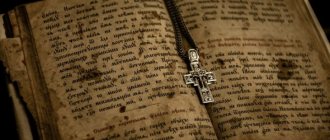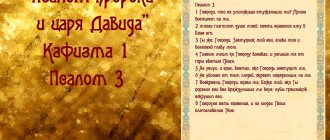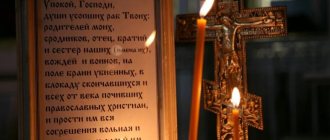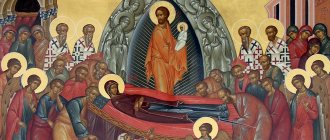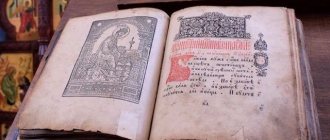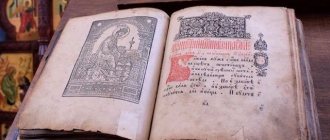Every person has his own calling. Some people are closer to the material world and work for the good of society. Others, feeling their closeness to God, go to serve in the monastery and help their brothers outside its walls with the help of prayers.
However, both of these worlds constantly intersect with each other. A secular person, feeling the need for God's grace, comes to the gates of the monastery and asks its servants to offer prayers for health or for the dead. He himself, in turn, brings donations, helping the temple develop and bring the light of Salvation.
From time immemorial, one of the options for such an “exchange” was an order for monks to read the Psalter around the clock (the Inexhaustible Psalter). For modest alms, brothers and sisters in the monastery constantly offer prayers with the remembrance of the indicated names for health or repose.
The Indestructible Psalter is a special type of prayer that is offered exclusively in monasteries, since it must be read without interruption around the clock, driving away demons from a person and invoking God’s grace. Thanks to this form, the Indestructible Psalter has incredible power to appease the Lord and crush dark forces.
What is the Psalter
Prayer accompanies a Christian in all his life’s affairs and circumstances. It is no coincidence that the Orthodox prayer book contains a huge number of different prayers. They were compiled by saints in moments of special spiritual state. And a special role is occupied by the book of Psalms, mainly consisting of prayer addresses of the Old Testament king David. The Indestructible Psalter is connected with the reading of this book.
It is one of the oldest liturgical books and is often called divinely inspired. The Holy Spirit himself suggested to David the heartfelt prayers of the psalms.
“In all Holy Scripture the grace of God breathes, but in the sweet book of psalms it breathes predominantly” (St. Ambrose of Milan).
Psalter revealed on Psalm 56
History and structure of the Psalter
The psalter takes its name from a ten-stringed musical instrument, the psalter, which is similar to the modern harp. This instrument served as an accompaniment to which psalms were sung during Old Testament services. The very name “Psalter” is translated as “Book of Praise,” since the psalms, like divine hymns, glorify the name of the Lord.
In total there are 150 psalms in the book. In addition to David (the 73 psalms are attributed to him), their authors were Solomon, Asaph and his descendants, Heman, Etham, the sons of Korah. The Psalter contains 20 sections, the so-called “kathisma” (chapters). Each of the kathismas includes, as a rule, from six to nine psalms. Kathisma, in turn, is divided into three “Glories”. At each of them the doxology is raised: “Glory to the Father, and the Son, and the Holy Spirit. Amen”, etc.
Reading the Psalter is important for an Orthodox Christian. The psalms, like a tuning fork, tune the soul into the right spiritual mood. Whether a person prays for the forgiveness of sins, asks for God's intercession, or praises the Lord for His manifested blessings - the entire depth of human feelings and experiences is reflected in the inspired words of the psalms.
“I think that in the words of this book the whole human life, the whole state of the soul, the whole movement of thought is measured and embraced, so that nothing more can be found in a person. Is it necessary to perform repentance and confession? Are you overwhelmed by sorrow and temptation? Are they persecuting you or plotting against you? Has despondency taken hold of you? Or, seeing yourself happy and your enemy humiliated, do you want to bring gratitude and praise to the Lord? Everyone can find guidance in the divine psalms. Let them read their words about each of these states, and every person will offer them up to the Lord, as if they were written about him” (St. Athanasius the Great).
An indefatigable psalter about health and peace in monasteries
Why is this prayer popular today? The Inexhaustible Psalter has enormous power and helps in the following:
- protects a person from the influence and influence of evil spirits;
- helps to eradicate sins and passion (any intemperance: alcohol, food, greed, anger, etc.);
- helps in healing the body and soul.
Usually the Psalter is read in churches, but only in fits and starts between the sermon and the sacraments. But in monasteries you can order the reading of the Indestructible Psalter for certain people (living and dead). This usually involves giving alms to the monastery.
Why can such a service be ordered only in monasteries? There are several reasons for this:
- Monks are given special grace to beg the laity - they live by prayer and are the most distant from worldly passions.
- The Psalter is a special prayer that has enormous power. The elders said that when they read the Vigilant Psalter, a pillar of fire rises from earth to heaven in the spiritual world.
- When reading the Vigilant Psalter for a certain person, angels protect him from temptations, protect him from evil spirits and tame the passions around and inside him.
- When reading such a prayer, the person’s name is mentioned not only when reading psalms, but also several times a day, at each kathisma.
- The monks read the texts for several days, replacing each other. It doesn’t matter whether it’s day or night on the street.
- The vigilant Psalter is considered a great sacrifice for an already departed soul.
- Maintenance of the monastery - as an independent organization, monasteries often require financial support, and the ordering of such services is accompanied by donations.
Psalter
The result of such an order will be the benefits:
- to the one who ordered it - as a desire to glorify the Lord, strengthening in faith and as a matter of mercy;
- the monastery, spiritually and financially;
- monks in their spiritual development;
- to those around him who ordered it, because this is an example of spiritual deeds and mercy.
You can order the Vigilant Psalter for your family and friends, friends and for yourself.
Advice! In monasteries, the Inexhaustible Psalter is read in Church Slavonic. For home reading, you can take the Russian Synodal Translation of the Holy Scriptures, it is more understandable to most people.
Where and how to order the Vigilant Psalter
As mentioned earlier, the Vigilant Psalter is read only in monastic monasteries and nowhere else.
Therefore, to order it, you should contact the nearest monastery that has accepted such a rite. The monastery can be male or female. In this case, it does not matter at all for whom exactly in which monastery the order is submitted, i.e. you can read for a man in a nunnery and vice versa.
The period for reading the prayer is from 40 days to a year.
Important! They do not order readings for the names of suicides, unbaptized people and people who support a different faith.
Price
The cost (donation amount) varies depending on the monastery. Moreover, some of them even accept orders through the Internet, the cost of which for one name starts at 400 rubles for a month or more. The amount of the donation also depends on the number of names to pray for.
But monasteries can accept payment not only with finances, but also with material assistance - food, firewood, building materials, etc.
What is important is not the amount or amount of assistance, but the feasible participation in the life of the monastery. At the same time, it should be understood that reading a prayer in a monastery is not a guarantee of a comfortable and problem-free life; a person must make efforts to draw closer to the Lord and renounce the temptations and passions of the world.
The Psalter as a source of prayer for all needs
Because of their importance and depth, psalms permeate all Orthodox services. They can be read in their entirety, for example, at the sixth psalm, a special part of the morning service. Or individual verses in the so-called prokeimnas.
In addition, according to the Church Charter, the entire Psalter must be read in order within a week. During Lent - twice a week.
It is of great importance for a Christian to read the psalms in his home prayer rule. The Holy Fathers recommend reading the Psalter in various difficult life situations and emotional experiences.
As the holy righteous John of Kronstadt said:
“David’s divinely inspired songs lead everyone to prayer, devotion to God, praise and thanksgiving to God for everything; they enlighten, nourish, delight and strengthen the souls of believers; they drive away invisible enemies, heal spiritual passions, teach them to love God and keep His commandments, pray for everyone and constantly ascend to God; and their sweetness, their benefit for the souls of the pious is innumerable...”
The Holy Fathers combined the psalms into specific groups indicating the needs in which prayers help. Based on this, a Psalter was compiled for every need. For example, for humility of spirit it is useful to read Psalms 5, 27,43, 54, 78. And in illness, Psalms 29, 46 and 69 will become helpers for a Christian.
The Monk Arsenios of Cappadocia often used psalms to bless various deeds and needs. The Athonite elder Paisius the Svyatogorets brought this together into a single Psalter of St. Arseny. In it, in order, under each number of the psalm, the need for which it is blessed to be read is indicated.
Psalms are not a magic spell
An Orthodox Christian resorts to the life-giving power of the Psalter in a variety of everyday needs. But it is important to understand that they themselves are not some kind of magic formula. Simply reading the text of the psalm in anticipation of the fulfillment of one’s desire looks more like some kind of witchcraft conspiracy. This is completely unacceptable for an Orthodox Christian.
According to Saint John Chrysostom:
“...Psalmody is always a triumph for those who rejoice, a consolation for those who are despondent, and some kind of holy spell; it is not like those spells that are presented in fables, but it tames passions like wild animals, curbs intemperance, extinguishes injustice, supports the truth, overthrows blasphemous plans, kills shameful thoughts, proclaims the Divine law, preaches God, explains the faith, stops the mouth heretics, builds the Church.”
When praying the psalms, you need to have sincere faith and heartfelt trust in God. Glorify the name of the Lord and entrust yourself to His will.
The Undying Psalter
Part of the answer to the question “what is the Indestructible Psalter” is helped by the very name of this special type of prayer. The word “unceasing” means unceasing. That is, the psalms are read around the clock, without breaks, day and night. Only monks perform this prayer.
All monasteries, despite different Charters and rules, are united by the Inexhaustible Psalter. As St. Augustine said: “The love of psalmody gave birth to monasteries.”
The tradition of continuous reading of the Psalter dates back about 15 centuries. Its founder was the Monk Alexander, who lived at the turn of the 4th-5th centuries. Having founded a monastery on the banks of the Euphrates River, the ascetic pondered for a long time whether a person could remain in constant praise of God. And if this is beyond the power of one person, then it can be accomplished by the entire brethren of the monastery. Each monk will take turns singing psalms, replacing each other. The Monk Alexander spent a long time in fasting and prayer turning to the Lord for a blessing for such a feat. And I received the answer: “Begin what you want - it pleases Me.” Thus, this monastery became the first to perform the rite of incessant psalmody.
In Rus' in the 11th century, the venerable Theodosius of Pechersk became the founder of the reading of the Undying Psalter. As rector of the Kiev Pechersk Lavra, he adopted the first Charter of the monastery. Its basis was the Charter of the famous Studite monastery in Constantinople. And for about 1000 years now, this special monastic prayer has been performed on Russian lands.
“Where the Indefatigable Psalter is read, it is like a pillar of fire reaching to the sky” (Elder Jerome of Sanaksar).
Order the Unsleeping Psalter
What is this book?
For most Orthodox Christians, the Psalter is the second book after the Gospel. When we pray the psalms, we enter into the experience of millennia! All texts in this book are divided into three groups: instructive; laudatory; repentant. In this sense, this book is unique.
Why sleepless?
The unceasing Psalter is read without interruption, day and night.
Holy Fathers on the Psalms
- John Chrysostom: “It is better for the sun to stop than to stop reading the Psalter.”
- Venerable Ambrose of Optina: “You will see through experience how great the power of God-inspired psalm words is, which scorch and drive away mental enemies like flame.”
- Basil the Great noted the benefits of reading the holy book to protect oneself from evil and gain inner peace.
- Elder Jerome of Sanaksar: “Where the indefatigable Psalter is read, it is like a pillar of fire reaching to the sky.”
- Venerable Parthenius of Kiev: “ The Psalter tames passions.”
- Athanasius the Great: “In the words of this book the whole human life, the whole state of the soul, the whole movement of thought is measured and embraced.”
- Elder Paisiy Svyatogorets: “The Psalter is an amazingly godly book, filled with tenderness and reverence. Reading it calms you down, distracts you from anxious, disturbing thoughts, and sets you up for a conversation with God.”
Written by whom?
Traditionally, King David is considered the author of the Psalter, although traces of later origin are evident in many of the psalms.
The Psalter, like any product of collective creativity, was created gradually, over several centuries.
History of reading the Psalter
The tradition of continuous reading of the Psalter dates back fifteen centuries.
The Monk Alexander, who lived at the turn of the 4th-5th centuries, drew attention to the words of the prophet: “Blessed is the man who meditates in the law of the Lord day and night” (Ps. 1:1-2). The clergyman suggested that man - just as the angels of the Lord glorify the Heavenly Father - will also be able to continuously glorify God. The monk pondered whether it was possible to vigilantly study the law of God’s praise. And if this is impossible for one person due to the weakness of the flesh, then it is possible for many to do this in church, taking turns by the hour. But the Monk Alexander did not dare to begin such a work without notification from God. And remembering the word of Christ: “Ask, and it will be given to you, knock, and it will be opened to you,” he turned to the Lord, begging for understanding of what to do. He prayed for three years and received the answer: “Begin what you want - it pleases Me.”
Thus, the monastery on the banks of the Euphrates River became the first to perform the rite of incessant psalmody. The Palestinian monastery itself began to be called the monastery of the Unsleeping.
Soon the Monk Alexander, with God's help, founded a similar monastery in the capital of the Byzantine Empire - Constantinople.
With Epiphany, the tradition of reading the Psalter around the clock came to Russian monasteries. The ancestor of the reading of the Undying Psalter in Rus' was the Monk Theodosius of Pechersk. And for a thousand years now, this special monastic prayer has been performed on Russian lands.
Why is the indefatigable Psalter read only in monasteries?
Because monks take on the responsibility of praying for the whole world. Monks live by prayer. Reading the texts, they renounce earthly things and, rushing to God, fulfill their main function - they glorify the Almighty.
It is almost impossible to organize the reading of the incessant Psalter in an ordinary parish. But there is a good practice of “twenties”. Twenty of the most active parishioners read one kathisma a day. The entire Psalter is read out in one day. Reading the Psalter proceeds in silence, in a reverent mood and pacifies the soul. This holy prayer protects the inhabitants of the locality from all evil with an invisible shield.
Great is the power of unceasing prayer
The indefatigable Psalter works wonders! When a monastery orders the reading of unceasing prayer for a person, incredible positive changes begin to occur in his life. People get out of debt, get rid of various diseases. single people find a partner and start families, and childless children have babies.
For prayer to be more beneficial, the person reading the Psalter must be in complete harmony with God.
This is just one of the great many testimonies of the beneficial nature of the indefatigable Psalter. In the life of the elder of the Pskov-Pechersk monastery, abbot Savva, there was a short period when he experienced some difficulties. There was not enough time for everything, I felt weak and despondent. One night before dawn, in a subtle dream, the Most Holy Lady appeared to him in full height with a crown on her head, as depicted on the icon “Joy of All Who Sorrow,” and quietly said: “Child! But you need to read the Psalter! This is your life!
This was the first appearance of the Mother of God. All difficulties disappeared as if by hand. Since then, he never stopped reading the Psalter, and subsequently led the reading of continuous prayer in the Pskov-Pechersk monastery.
How is the indefatigable Psalter read?
A special place is allocated for reading the continuous prayer in the temple or in the monastery cell. The abbot of the monastery appoints those responsible from among the brethren, who replace each other at the appointed time.
The Psalter is read around the clock, and at each “Glory” (part of the prayer) the names of the people for whom notes were submitted are remembered.
All Orthodox services are permeated with psalms. They can be read in their entirety or as separate verses. In addition, according to the Church Charter, the entire Psalter must be read in order within a week. During Lent - twice a week.
During the reading of the entire Psalter, the person commemorated receives powerful spiritual support, because in the monastery they turn to God with prayer for him at least 60 times.
Reading the Psalter about health
Continuous psalmody for living people benefits both the soul of the reader and the one commemorated. The indefatigable Psalter helps a person overcome sinful addiction (drug addiction, alcoholism, fornication, adultery, gambling and computer games, etc.); to be healed from diseases, including fatal ones; make the right decision in difficult life situations and find a way out of difficult circumstances; protect yourself from evil spirits and their influence.
They order the never-ending Psalter for themselves. An Orthodox Christian resorts to the life-giving power of the Psalter in a variety of everyday needs. But it is important to understand that prayer itself is not a magic formula. You can't spend time waiting for your desire to come true. The main thing is to live according to the commandments of Christ.
Important: the indefatigable Psalter can only be read about people baptized in the Orthodox faith.
Reading the Psalter of Repose
When a person passes into another form of existence, the living are obliged to fulfill their duty of love to the deceased not by a wake with alcohol, but by prayerful remembrance and doing good deeds. If a person reads the psalter for several days, then he can start with the first kathisma. If this is a one-time commemoration, then the 17th kathisma is read. She is the one considered dead. It is read by the clergy on memorial Saturdays in churches.
Prayer according to the texts of the holy book is necessary for the deceased, as it gives his soul relief. The living do not know the afterlife fate of the deceased and the internal state in which he passed into another world. Therefore, unceasing prayer for the departed is desirable.
As a rule, the indestructible Psalter is ordered for one month, for six months
or for
a whole year
.
Important: if the Psalter of Repose is read, one must not remember those who committed suicide.
Where is the indefatigable Psalter read?
It is read in almost every Orthodox monastery. Having decided to receive prayer help through the indefatigable Psalter, go to any monastery and submit your name or the name of a loved one for this prayer. Continuous prayer is considered the most dear church requirement. However, the money donated will be repaid to you a hundredfold. Seeing the result will strengthen your faith even more.
And finally. Prayer is not just “read out.” It comes from the heart as an appeal to God. Will the Lord help? God has everything in time for those who know how to wait.
How to read the Indestructible Psalter
As a rule, the feat of reading the Undying Psalter is carried out by the entire brethren of the monastery. The abbot of the monastery draws up a schedule in advance, in which everyone has their own reading order both day and night. This order is necessary so that the Holy Psalter is never closed. The reading takes place in the temple or in a nearby cell specially designated for this purpose.
“I ask and pray you, beloved, do not leave your hour of reading the Incessant Psalter and pray more diligently for each other, for relatives, for everyone you know and for the whole world, for all the departed who thirst for our prayers, for this is a great help for their souls.” (schema abbot Savva (Ostapenko).
Reading order at home
The reading of the psalms can be ordered at the monastery or read independently at home. Worshipers recommend involving all family members in this process and drawing up a schedule in advance. If a person wants to do this alone, then he should definitely try, don’t be afraid. The Lord will always give strength. Before you start reading the Indestructible Psalter, you should familiarize yourself with the basic rules:
- when reading, a church candle or lamp should be lit;
- you should prepare the place and make sure that nothing interferes with the process;
- reading should take place measuredly, slowly, out loud, in a quiet voice;
- it is important to read kathismas while sitting, so you should prepare a chair;
- songs and “glories” are declared only while standing;
- The sincerity of the reading is important, you don’t need to force yourself to do it;
- exclude gestures, artistry, pathos.
If during reading a person does not understand some idea of the text, he should then turn to the clergy so that he can interpret the meaning of this or that passage.
Before starting, it is important to read a prayer, turn to God and ask for strength. After reading, it is important to visit a temple or church, confess and receive communion.
